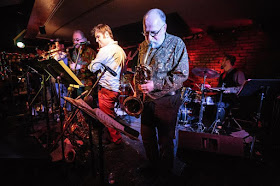Founded in 1985 by saxophonist & composer Russ Gershon, the ten-piece Either/Orchestra, based in Somerville MA, is one of the jazz world's most long-lived and distinguished groups. Alumni include jazz stars such as John Medeski, Matt Wilson, Miguel Zenon, Jaleel Shaw & Josh Roseman.
The E/O, featuring a six piece horn section, piano, bass, drums and congas, has put its stamp on just about every style of jazz, from big band, swing and bop to Latin jazz, electric and avant-garde. The last decade or more has found the band absorbing an Afro-Caribbean influence through a succession of Latino members.
Teshome Mitiku with Either/Orchestra
More unusually, the E/O has become deeply involved with Ethiopian music, touring there and collaborating with many Ethiopian greats of the outstanding 1960's generation. Mulatu Astatke, Mahmoud Ahmed and Teshome Mitiku are among the band's favorites. The Ethiopian connection includes the double CD Ethiopíques 20: Live in Addis and the DVD Ethiogroove: Mahmoud Ahmed and Either/Orchestra.
Over the years, the E/O has been recognized with five Boston Music Awards, perennial placement in the Big Band category of the Down Beat International Critics Poll, and leader Gershon was nominated for an arranging Grammy for his composition "Bennie Moten's Weird Nightmare," included in The Calculus of Pleasure.
The E/O began performing original arrangements of Ethiopian songs, inspired by a compilation called Ethiopian Groove: the Golden 70s. In 2000, after three of these songs appeared on the album More Beautiful than Death, Francis Falceto, the producer of Ethiopian Groove, contacted Gershon and eventually arranged an invitation for the E/O to play at the Ethiopian Music Festival in Addis Ababa in 2004.
Along with Indo-British singer Susheela Raman the same year, the E/O was the first non-Ethiopian artist to appear in the festival, and was the first US big band to appear in Ethiopia since Duke Ellington's in 1973. Their concert at the festival was recorded and ultimately appeared in Falceto's Ethiopiques series on the French Buda Musique label. Five Ethiopian guests appear on the recording: Mulatu Astatke, Getatchew Mekurya, Tsedenia Markos, Bahta Hewet and Michael Belayneh. This tour and recording have led to an ongoing collaboration with Astatke, the primary founder of Ethiopian jazz, concerts with Ethiopian expatriates singer Hana Shenkute, krar player Minale Dagnew, masinko player Setegn Atanaw, and the great Ethiopian singer Mahmoud Ahmed with whom E/O released a DVD in 2007.
Mahmoud Ahmed and fellow legendary Ethiopian singer Alemayehu Eshete played Lincoln Center Out of Doors in 2008 backed by E/O. The group debuted a collaboration with vocalist Teshome Mitiku in the summer of 2010, including a headlining appearance at the Chicago Jazz Festival.
Either Orchestra - 01 - Introduction (3:03)
Either Orchestra - 02 - Tigrigna,Oromigna,Guragigna (14:06)
Either Orchestra - 03 - Arehibi (9:34)
Either Orchestra - 04 - Ethiopia (5:20)
Either Orchestra - 05 - Yamnaw Bedele (6:55)
Either Orchestra - 06 - Yeqir Beqa (6:07)
guests :
Minnale Danew - krar
Setegn Atanaw - masinko
Hana Shenkute - vocal
















